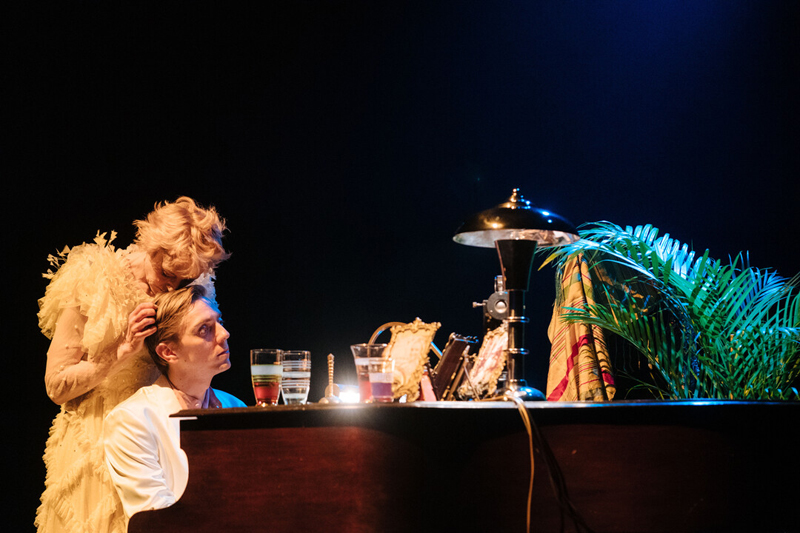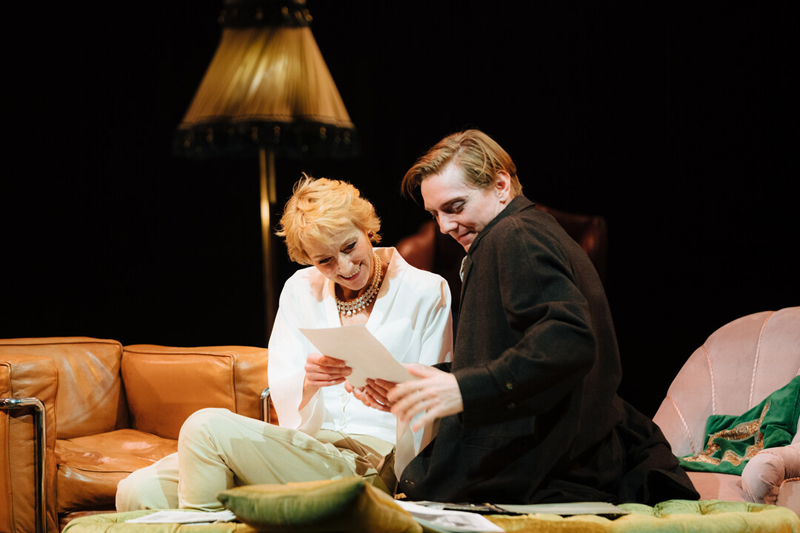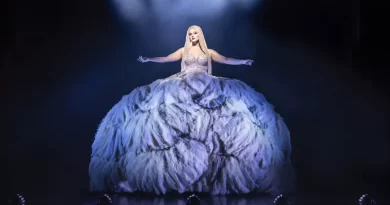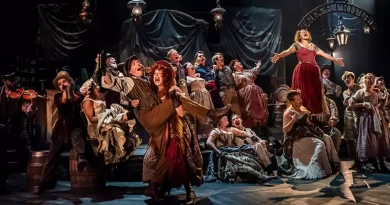“The Vortex” at Chichester Festival Theatre
Mark Shenton in West Sussex
5 May 2023
Hot on the heels of the scintillating revival of Noël Coward’s Private Lives, currently running at the Donmar Warehouse and reviewed here by Neil Dowden who points out that the play “has rarely been off stage since it premiered in 1930”, Chichester Festival Theatre now revives Coward’s much more rarely-seen 1924 play The Vortex.

Lia Williams and Joshua James.
Photo credit: Helen Murray.
This play could be re-titled “Private Demons”; it lays devastatingly bare the reckoning a mother must face as she refuses to embrace her own ageing and cuckolds her loyal long-suffering husband in plain sight as she pursues romantic dalliances with much younger men. She is also long guilty of neglecting her 24-year-old son who retreats into drug abuse to numb his private pain.
Coward’s first West End success, it was premiered with Coward himself playing the son at the age of 25. (John Gielgud was his understudy.) Even bigger hits would follow, but The Vortex shows remarkable maturity and daring for the tyro playwright who is unafraid of exposing deep-rooted anxieties in human relationships.
This emotional rollercoaster of a play about a desperately co-dependent relationship between a mother and her son is given a brisk and bracing new staging by director Daniel Raggett. His fast and furious production of Accidental Death of an Anarchist (also reviewed on this website) is now set to transfer to the West End in June after runs at Sheffield’s Crucible and the Lyric Hammersmith.
Raggett brings naturalistic impulses to the heightened air of sophisticated but vacuous Jazz Age characters who are determined to keep the party going whatever the cost; he helps his actors to mine the text for its painful undercurrents and grit instead of the surface wit. The cast also regularly talk over each other; they are portraying people who like to be the centre of attention rather than spending any time listening to their peers.

Lia Williams and Joshua James.
Photo credit: Helen Murray.
Though the play is a slow burn, it achieves a gathering tension before a devastating final act — the stage now all but stripped of scenery — in which the mother and son finally tell each other the hard truths about where they both are.
Lia Williams — who I’ve long regarded as one of our very best contemporary actors — plays Florence Lancaster with a flighty glamour that disguises the real terror she has of getting older. And in a casting coup that both reinforces the play’s themes but also makes it even more vivid and daring, Williams’s real-life son Joshua James plays her stage son Nicky Lancaster with disarming charm even as he is suppressing a latent addiction that could unravel his life.
They are spellbinding, their exceptional techniques bringing a fierce sense of trust between each other as actors to the distrust that the characters they are playing have one for another.
Coward’s play and Raggett’s production animate the people around them with serious conviction too, including Isabella Laughland as Nicky’s intended bride Bunty Mainwaring, Priyanga Burford as Florence’s best friend Helen Saville, Sean Delaney as Florence’s lover and the estimable Hugh Ross as her husband.
Joanne Scotcher’s handsome traditional drawing room set revolves and is gradually stripped bare as the play proceeds, just as the two lead characters are stripped of their desperate playfulness and innocence to face up to the truth about themselves.
It’s a wounding play — my companion, reflecting on her troubled relationship with her own mother, sobbed through the third act. And I was persuaded that an often-neglected play more than earns its place here, opening this year’s summer season at Chichester in both high style and with deep feeling.
This year marks the fiftieth anniversary of Coward’s death, but his plays remain as enticing and alive as ever, when — as here and at the Donmar — they are treated as living things not museum pieces that belong to another age. The production duly contains some liberties taken with the period such as the interpolation of a David Bowie song. But when Nicky plays Gershwin’s “Rhapsody in Blue” on the piano, it returns perfectly to period since Gershwin wrote it the same year as this play premiered.
.
.
~









